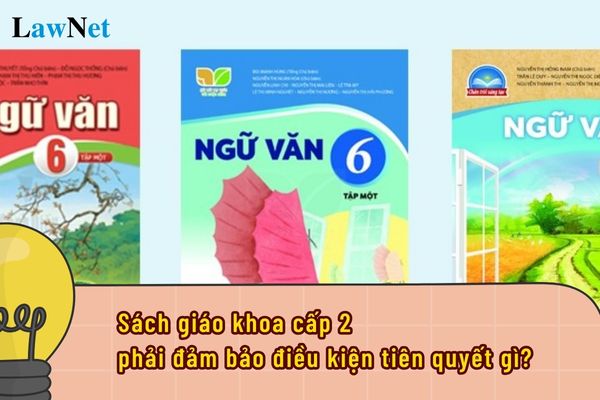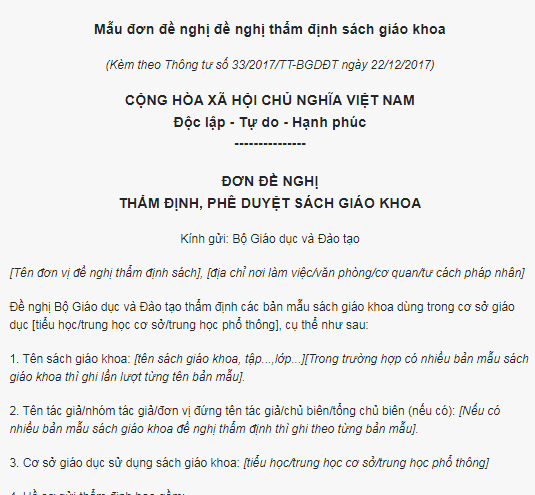What are the essential requirements for lower secondary school textbooks in Vietnam?
What are the essential requirements for lower secondary school textbooks in Vietnam?
* Note: The regulations on standards and procedures for compiling and editing textbooks, standards for organizations and individuals compiling textbooks; the organization and activities of the National Textbook Evaluation Council are issued pursuant to Circular 33/2017/TT-BGDDT (referred to as the Regulations issued pursuant to Circular 33/2017/TT-BGDDT).
According to Article 4 of the Regulations issued pursuant to Circular 33/2017/TT-BGDDT, the essential requirements for textbooks are as follows:
Essential requirements for textbooks
1. The content and format of textbooks must not violate the laws of Vietnam and must comply with national standards for publications.
2. The content and format of textbooks must not contain prejudices regarding ethnicity, religion, occupation, gender, age, and social status.
Thus, in accordance with the regulation, lower secondary school textbooks must ensure that their content and format do not violate Vietnamese laws and adhere to national standards. Furthermore, textbooks should not contain prejudices regarding ethnicity, religion, occupation, gender, age, and social status.

What are the essential requirements for lower secondary school textbooks in Vietnam? (Image from the Internet)
Which form is used to request the evaluation of lower secondary school textbooks in Vietnam?
The form to request the evaluation of textbooks is stipulated in the Regulations on standards and procedures for compiling and editing textbooks, standards for organizations and individuals compiling textbooks; the organization and activities of the National Textbook Evaluation Council issued pursuant to Circular 33/2017/TT-BGDDT as follows:

Download Form to request the evaluation of lower secondary school textbooks
How many stages are there in compiling and editing textbooks in Vietnam?
According to Article 9 of the Regulations issued together with Circular 33/2017/TT-BGDDT (amended and supplemented by Clause 2, Article 1 of Circular 05/2022/TT-BGDDT), the process for compiling and editing textbooks is specified as follows:
Stage 1: Procedure for compiling textbooks
- Organizations and individuals compiling textbooks select authors who meet the standards stipulated in Article 11 of the Regulations issued pursuant to Circular 33/2017/TT-BGDDT (amended by Clause 5, Article 1 of Circular 05/2022/TT-BGDDT and Clause 1, Article 1 of Circular 23/2020/TT-BGDDT).
Authors study the general education program issued by the Minister of Education and Training to develop an overall outline, a detailed outline, and a compilation plan;
Assign tasks to the chief editor, main editor (if the textbook has a chief editor, main editor), and authors to ensure the appropriateness of the workload and timeline to ensure the quality and progress of the textbook manuscript;
- Organizations and individuals compiling textbooks organize the compilation, editing, design, illustration, and completion of at least one lesson, organize experimental teaching, seek feedback after experimental teaching to improve that lesson with contributions and consensus from all authors before organizing the compilation of other lessons;
Organize compilation, editing, design, illustration, experimental teaching, and seek feedback from teachers, education managers, scientists, and educators knowledgeable about general education to review and evaluate the textbook manuscript.
- The Ministry of Education and Training organizes the appraisal of textbook manuscripts as prescribed in Chapter 4 of the Regulations issued pursuant to Circular 33/2017/TT-BGDDT;
- Organizations and individuals compiling textbooks complete the textbook manuscript after appraisal;
- The Minister of Education and Training approves and permits the use of textbooks;
- Organizations and individuals compiling textbooks organize the publication and distribution of textbooks in accordance with the law.
Stage 2: Requirements and procedures for experimental textbooks
- For each textbook manuscript, select lessons to organize experiments that are representative of lesson types, exhibiting new content points, teaching methods, and organizational forms of learning according to the subject program, education activities;
Organize experiments for at least 10% of the total number of periods for subjects or educational activities with more than 105 periods per school year, at least 15% of the total number of periods for subjects or educational activities with 70 to below 105 periods per school year, and at least 20% of the total number of periods for the remaining subjects or educational activities;
Each lesson is taught experimentally at least 02 (two) times; after the first experimental teaching, organize a review and edit the lesson before conducting the second experimental teaching;
- General education institutions selected for organizing experimental teaching must ensure regional representation; classes selected for experimental teaching belong to the grade level with textbooks to be experimented; experimental teaching is conducted for the entire class at a time appropriate to the students' abilities.
Teachers conducting experimental lessons and those observing shall be currently teaching the subject with the textbooks being experimented on; each experimental lesson must have at least 03 (three) teachers observing and providing feedback on the experimental lesson;
- Organizations and individuals compiling textbooks organize the evaluation of the experimental lesson according to the content of each clause (excluding the contents not presented in the lesson) as stipulated in Articles 4, 5, 6, 7, and 8 of the Regulations issued pursuant to Circular 33/2017/TT-BGDDT (specific requirements according to the Textbook Evaluation Criteria attached to Circular 33/2017/TT-BGDDT).
Stage 3: Procedure for editing textbooks
- During usage, textbooks may be edited;
- The procedure for editing textbooks is implemented as the procedure for compiling textbooks stipulated in Clause 1, Article 9 of the Regulations issued pursuant to Circular 33/2017/TT-BGDDT, amended and supplemented by Clause 2, Article 1 of Circular 05/2022/TT-BGDDT, except for experimental textbooks. The necessity to organize experimental textbooks is decided by the Minister of Education and Training.
Thus, according to the regulations, there are 3 stages in compiling and editing textbooks.

